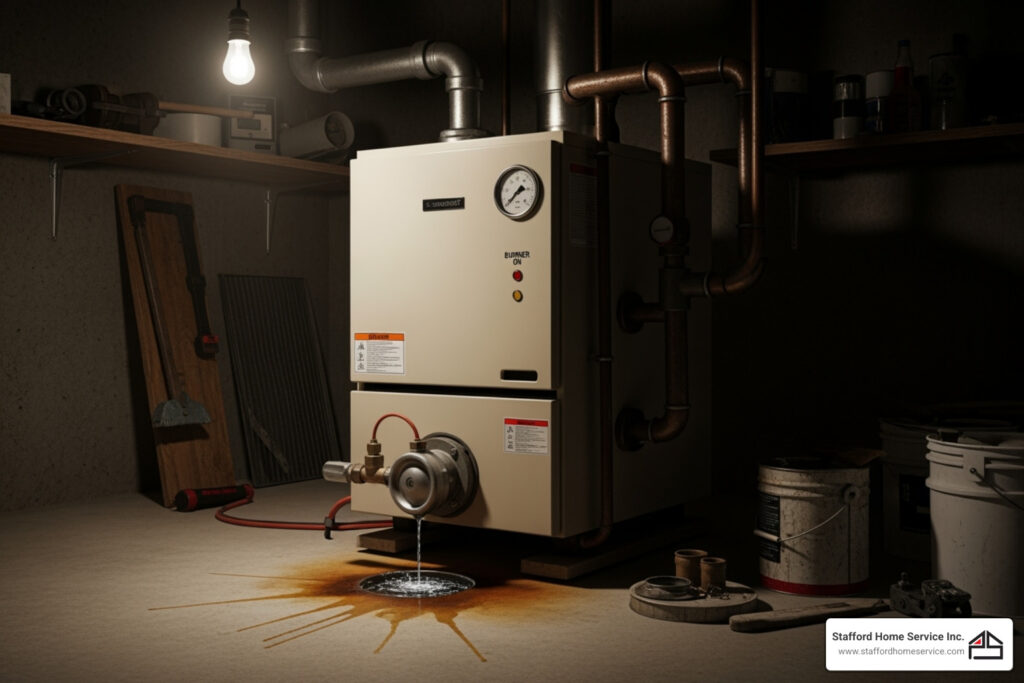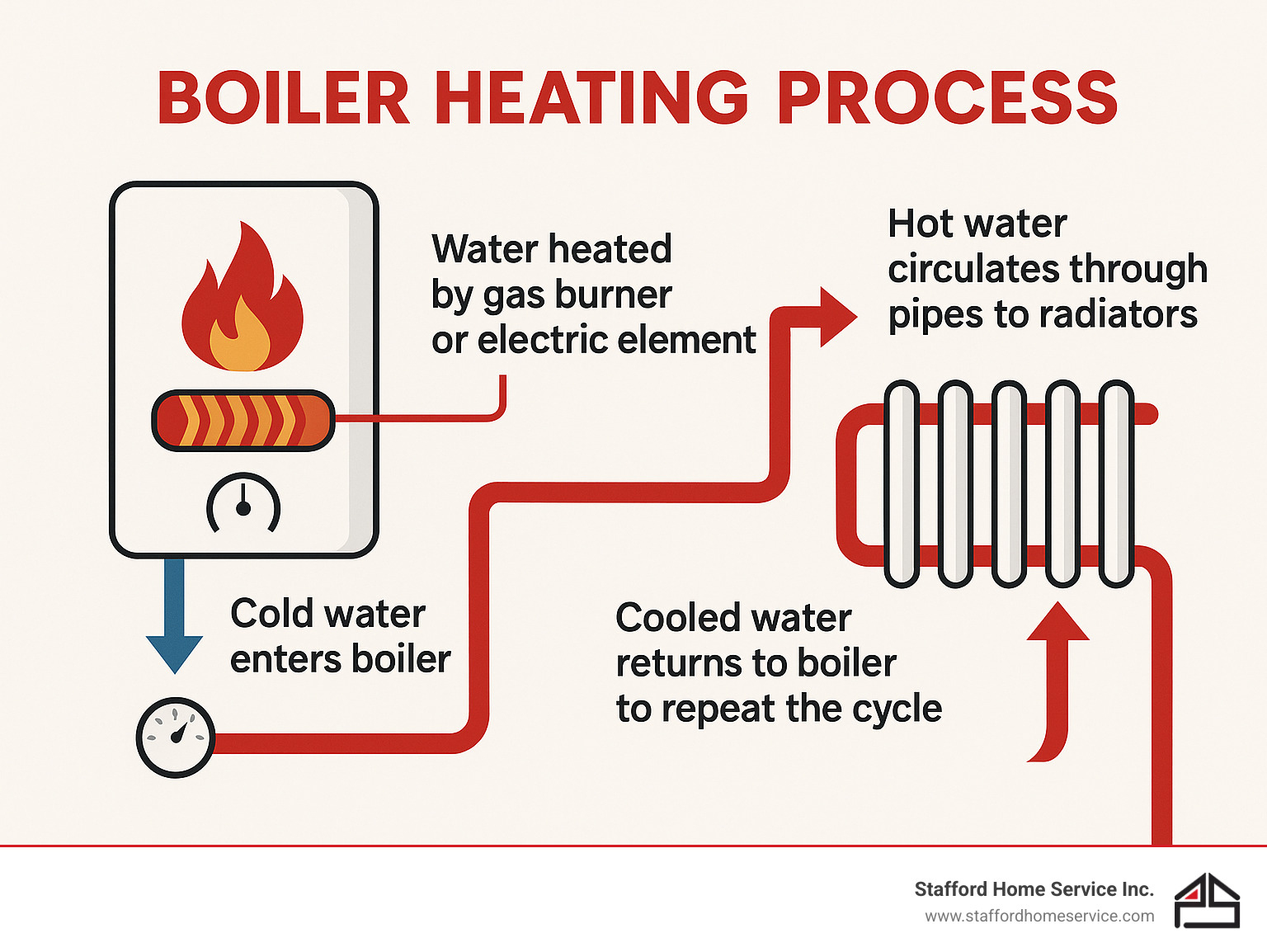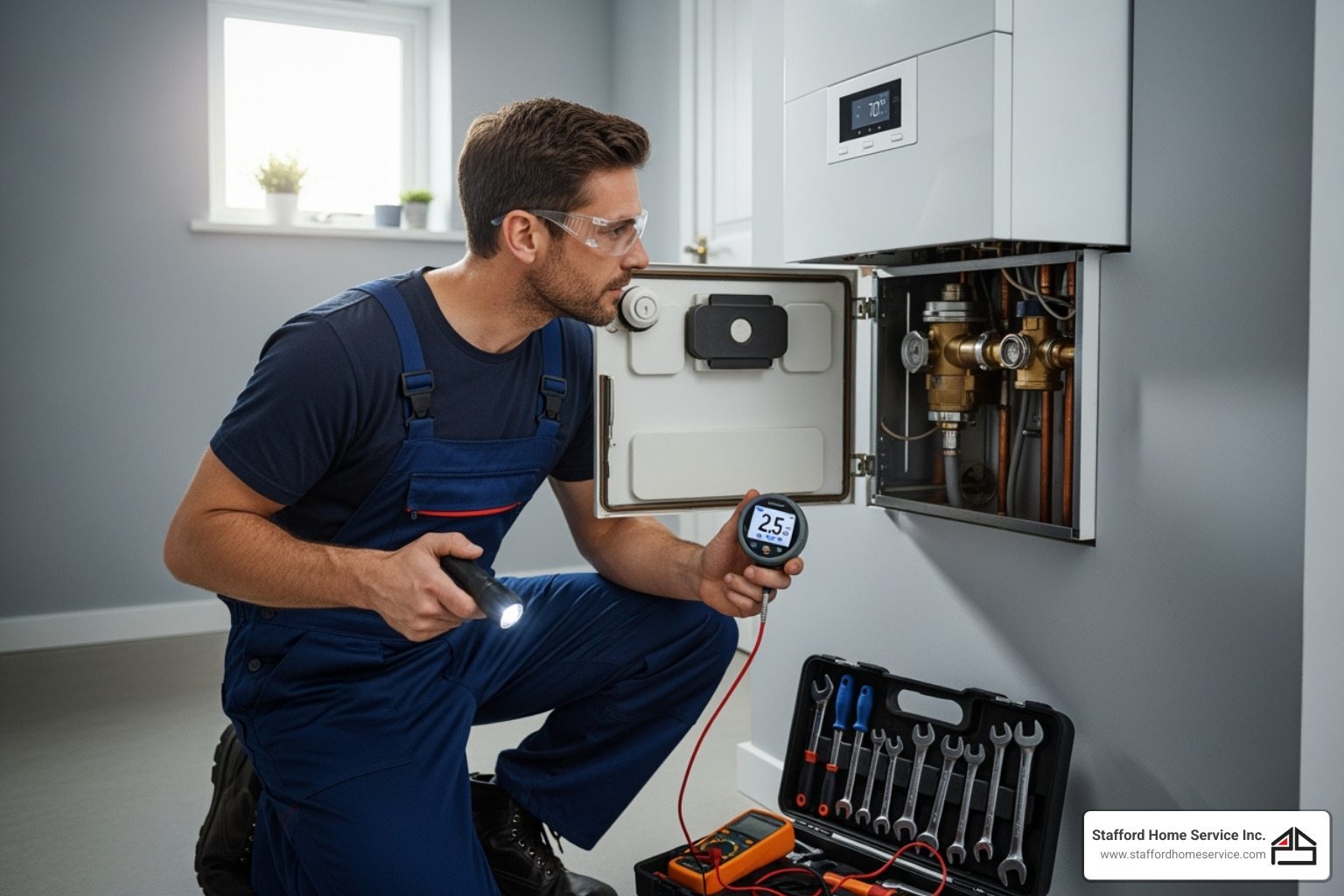When Your Home’s Heat Disappears: Understanding Boiler Problems
Boiler not heating issues can quickly turn your comfortable home into a cold space. When you wake up to a chilly house or a cold shower, your boiler has likely stopped working.
Quick Solutions for Common Boiler Problems:
- Check power supply – Reset tripped breakers or replace blown fuses.
- Verify gas supply – Ensure the gas valve is open and other appliances work.
- Inspect thermostat – Confirm heat mode, temperature setting, and battery life.
- Check boiler pressure – The gauge should read between 1-1.5 bar.
- Look for frozen pipes – Thaw the condensate pipe with warm water if frozen.
- Reset the boiler – Press the reset button and wait for it to restart.
Most boiler heating problems fall into common categories like power issues, low water pressure, frozen condensate pipes, and thermostat problems. Many of these have simple fixes you can try yourself.
However, some issues like gas leaks, major water leaks, or repeated boiler lockouts require an expert immediately. Safety is paramount with gas appliances. Understanding that your boiler heats and circulates water helps you troubleshoot. If this process breaks down, you lose heat.
First Steps: Simple DIY Checks for a Boiler Not Heating
When your boiler not heating leaves you shivering, don’t panic. Many heating problems have simple causes you can fix in minutes. Start with the most obvious clues, as a “broken” boiler often just needs a switch flipped or a battery replaced. These basic checks can save you money and a service call.
Checking the Power and Gas Supply
Your boiler needs fuel to run, so checking the power and gas supply should be your first move. If your boiler’s display is dark, you have a power problem. Check your circuit breaker box for any tripped switches, often labeled “furnace,” “boiler,” or “heating.”
Flip a tripped breaker back to “on.” If it trips again, stop. This indicates a serious issue needing professional attention. For older homes, check for blown fuses.
Next, check the gas supply. The valve handle on the pipe leading to your boiler should be parallel to the pipe (open), not perpendicular (closed). If it’s closed, turn it to the open position. To test the main gas supply, check other gas appliances like your stove. If they don’t work, the issue could be with your main supply.
Understanding preventing electrical overloads can help you avoid these power problems in the future.
Inspecting Your Thermostat and Programmer
Your thermostat controls your boiler, so if it’s not communicating correctly, your home won’t heat up. First, ensure your thermostat is in “heat” mode, not “cool” or “off.” This simple oversight is a common cause of a boiler not heating.
Check that the temperature setting is higher than the current room temperature. If not, the boiler won’t turn on.
For battery-powered thermostats, dead batteries are a common culprit. Weak batteries can prevent communication with the boiler, so replace them annually.
For smart thermostats, verify the Wi-Fi connection. Internet or power issues can disconnect them, preventing them from controlling your heat. Also, check your programmer schedule, as power outages can reset it to default settings.
These simple steps are part of effective heating system maintenance. For more guidance, see our guide on how to diagnose and fix heater problems. If these checks don’t solve your boiler not heating problem, it’s time to investigate more technical issues.
Diagnosing Common Boiler Issues: Pressure, Ignition, and Pipes
If basic checks fail to fix your boiler not heating, it’s time to look at more technical issues like water pressure, ignition problems, or frozen pipes. Understanding these can help you solve the problem.
Why Your Boiler Not Heating Could Be a Pressure Problem
Water pressure is vital for your heating system. Without it, hot water can’t circulate to your radiators. Your boiler’s pressure gauge should read between 1 and 1.5 bar when the system is cold.
Low pressure (below 1 bar) will cause your boiler to shut down for safety. It’s often caused by bleeding radiators or small, unnoticed leaks. You can usually repressurize your system using the filling loop (a flexible hose or special key). Follow your manual’s instructions to add water until the gauge hits 1.5 bar. Always turn the boiler off first and close the valves tightly afterward.
High pressure (above 2 bar when cold) is less common but also problematic. Bleeding a radiator can release some pressure, but do so carefully. If you find yourself repressurizing frequently, you have a leak that needs professional attention. Our team can help you Identify and Fix Boiler Repair Issues before they worsen.
Troubleshooting the Ignition System When Your Boiler is Not Heating
No ignition means no heat. How you fix this depends on your boiler’s age.
Older boilers (pre-2004) often have a standing pilot light. If this flame is out, that’s your problem. Follow the relighting instructions on the unit. If it won’t stay lit, you may have a faulty thermocouple, a safety device that requires professional replacement.
Modern boilers use electronic ignition. If you hear clicking but the boiler fails to start, the igniter might be worn out. These components typically last three to five years. Ignition problems often require specialized tools, so for more general guidance, you can check out information about Repairing a hot water boiler.
Is a Frozen Condensate Pipe the Culprit?
If your boiler not heating coincides with a cold snap, a frozen condensate pipe could be the cause. Modern condensing boilers produce wastewater (condensate) that exits through an external pipe. In freezing temperatures, this pipe can freeze solid, creating a blockage.
Signs of a frozen pipe include gurgling sounds from the boiler or pipe, followed by a boiler lockout for safety. To fix this, thaw the pipe safely by pouring warm (not boiling) water over it or wrapping it with warm cloths. Boiling water can crack the pipe. Once thawed, the boiler should reset. To prevent this, insulate the external pipe with foam lagging.
Advanced Problems: Internal Faults and System Blockages
If basic troubleshooting fails to fix your boiler not heating, you may have a more complex internal issue. These problems often require professional diagnosis. Understanding them can help you communicate with a technician and make informed decisions.
Understanding Kettling, Sludge, and Sediment Buildup
Over time, mineral and debris buildup can interfere with your heating.
Kettling (a banging, whistling, or rumbling sound) is caused by limescale buildup on the heat exchanger, common in hard water areas. This buildup restricts water flow, causing water to overheat and create steam bubbles. Kettling is noisy, wastes energy, and can damage your boiler.
Sludge buildup, a mix of rust and debris, can block your heating system. Signs include radiators that are cold at the bottom but warm at the top or some radiators not heating at all. The sludge prevents hot water from circulating properly.
Sediment acts like limescale, insulating heating elements and making it harder for your boiler to heat water efficiently. Professionals can fix these issues with chemical descaling or a power flush, which cleans the entire system. Ignoring these problems can lead to Common Costly Home Heating Mistakes that maintenance could prevent.
Identifying Faulty Internal Boiler Components
Sometimes a boiler not heating is due to a specific failed part, which usually requires professional diagnosis.
- Circulator Pump: This pushes hot water to your radiators. If it fails, pipes near the boiler may be hot, but radiators stay cold. A failing pump might make grinding noises or be silent.
- Diverter Valve: Common in combi boilers, this directs hot water to either taps or radiators. If it gets stuck, you might have hot water but no heating, or vice versa.
- PCB (Printed Circuit Board): This is the boiler’s brain. A failure can cause a dead boiler, intermittent heating, or error codes. PCB repairs are costly, and replacement might be a better option for older boilers.
Modern boilers use safety features that cause a boiler lockout when they detect problems, often displaying an error code. These codes are valuable for technicians. Regular professional maintenance is your best defense; proper Heating Service for System Longevity can catch these issues early.
When to Call for Professional Boiler Repair
While DIY fixes are great, some boiler not heating situations require immediate professional attention. Knowing when to call an expert can prevent property damage, costly mistakes, or even save your life.
Safety First: Signs You Need an Expert Immediately
If you encounter any of these dangerous warning signs, turn off your boiler and call for help immediately.
- Smell of gas: This is a true emergency. If you smell gas, turn off the supply at the meter, open windows, evacuate, and call the Gas Emergency Service. Do not use any electronics or switches. Find instructions on how to Report a Gas Emergency.
- Carbon monoxide detector alarms: CO is invisible, odorless, and deadly. If your alarm sounds, evacuate immediately and call emergency services.
- Major water leaks: Significant leaks can cause extensive water damage and electrical hazards. Turn off your boiler and water supply if you can do so safely.
- Soot or scorch marks: These marks around your boiler indicate incomplete combustion, which can produce carbon monoxide.
- Electrical issues: Repeatedly tripped breakers, sparks, or a burning smell signal serious faults that require a professional.
Repair or Replace? Deciding the Fate of Your Boiler
When your boiler not heating becomes a recurring problem, you must decide whether to repair or replace it.
Age is a key factor. Most boilers last 15-20 years. If yours is older and having issues, replacement is often more cost-effective than repeated repairs.
Frequent repairs and rising energy bills are also signs your boiler is struggling. Older boilers lose efficiency, and after one part fails, others often follow.
Consider the repair versus replacement calculation. When repair costs reach 50% or more of the replacement cost, especially for boilers over 10 years old, replacement is usually the better financial choice. New boilers are far more efficient and can significantly cut your heating bills, with savings that can quickly offset the initial investment.
Our technicians provide honest assessments to help you understand all your options. For more guidance, read about the Signs You Need to Replace Your Heating System.
Frequently Asked Questions about Boiler Heating Problems
When your boiler not heating leaves you with questions, we have answers. Here are the most common questions we hear from homeowners in Minneapolis.
Why is my boiler on but the radiators are cold?
It’s puzzling when your boiler seems to be working but the radiators stay cold. There are several logical explanations:
- Trapped air: If radiators are warm at the bottom but cold at the top, you likely have trapped air. Use a radiator key to bleed the air.
- Sludge buildup: If radiators are cold at the bottom and warm at the top, or some don’t heat at all, accumulated rust and debris are likely blocking water flow.
- Faulty circulator pump: This part pushes hot water through your system. If it fails, the water stays in the boiler.
- Stuck diverter valve: In combi boilers, this valve can get stuck, sending hot water to taps but not radiators.
- Thermostatic radiator valves (TRVs): These individual controls can get stuck in the closed position.
How do I reset my boiler safely?
Resetting your boiler can sometimes be a quick fix. Start with your boiler’s manual, as each model has a different reset procedure. Most have a reset button on the control panel that you need to press and hold for 3-5 seconds. After pressing it, be patient and allow the boiler a few minutes to complete its startup sequence.
Avoid repeated resets. If the boiler locks out again quickly, stop. This indicates an underlying problem that needs a professional. Continuous resetting only masks the issue.
What should I do if my boiler keeps losing pressure?
A boiler that constantly loses pressure indicates a leak in the system. Look for visible leaks around the boiler, under radiators, and along pipes. Even tiny drips or water stains can indicate the source of pressure loss. Also, ensure all radiator bleed valves are completely tight.
Repressurizing your system is only a temporary fix. If pressure loss is frequent or rapid, it’s time to call a professional. The leak could be internal or hidden within walls. Getting Timely Boiler Repair Prevents Issues and can save you from bigger problems later.
Conclusion: Restoring Warmth and Comfort to Your Home
When your boiler not heating disrupts your comfort in Minneapolis, Edina, Golden Valley, Minnetonka, Plymouth, or St. Louis Park, many problems have simple DIY solutions. We’ve covered basic checks and more complex issues, and starting with the basics can save you time and money.
However, knowing when to call for help is crucial. Safety is paramount with gas appliances. If you smell gas, your CO detector alarms, or you see soot marks, turn off the system and call a professional immediately.
At Stafford Home Service Inc., we know heating problems are urgent. We offer quality workmanship and complete customer satisfaction, backed by our experienced owners, the Daikin Comfort Promise, and flexible financing options to make repairs or replacements manageable.
Deciding between repair and replacement is tough, but we provide honest assessments to help you choose. Annual maintenance can prevent many issues, extend your boiler’s life, and lower energy bills.
Don’t let a faulty boiler leave you in the cold. For expert diagnosis and reliable heating repair in Minneapolis, our experienced team is ready to restore warmth to your home. Request Service today, and let us bring our expertise to your doorstep.







